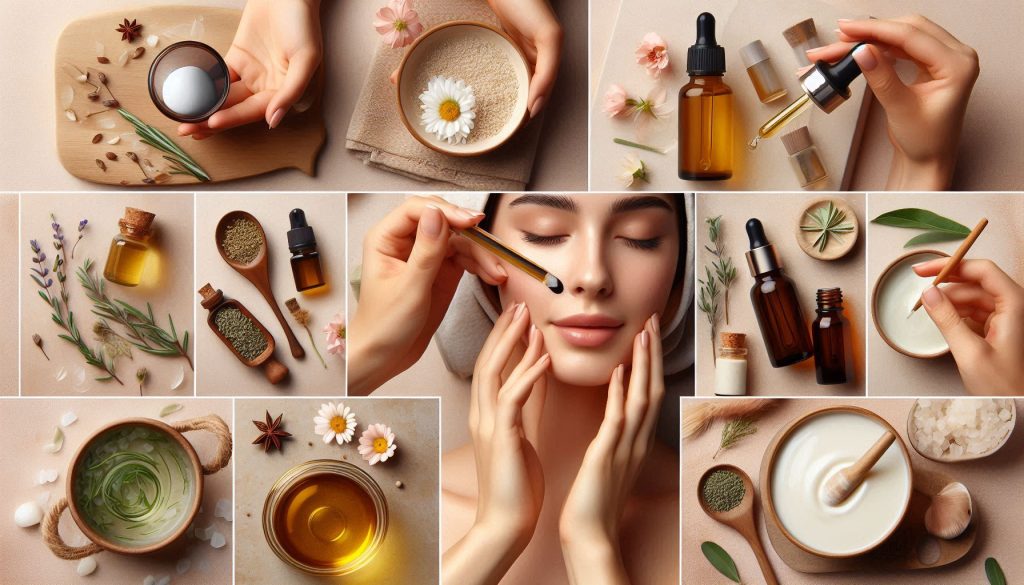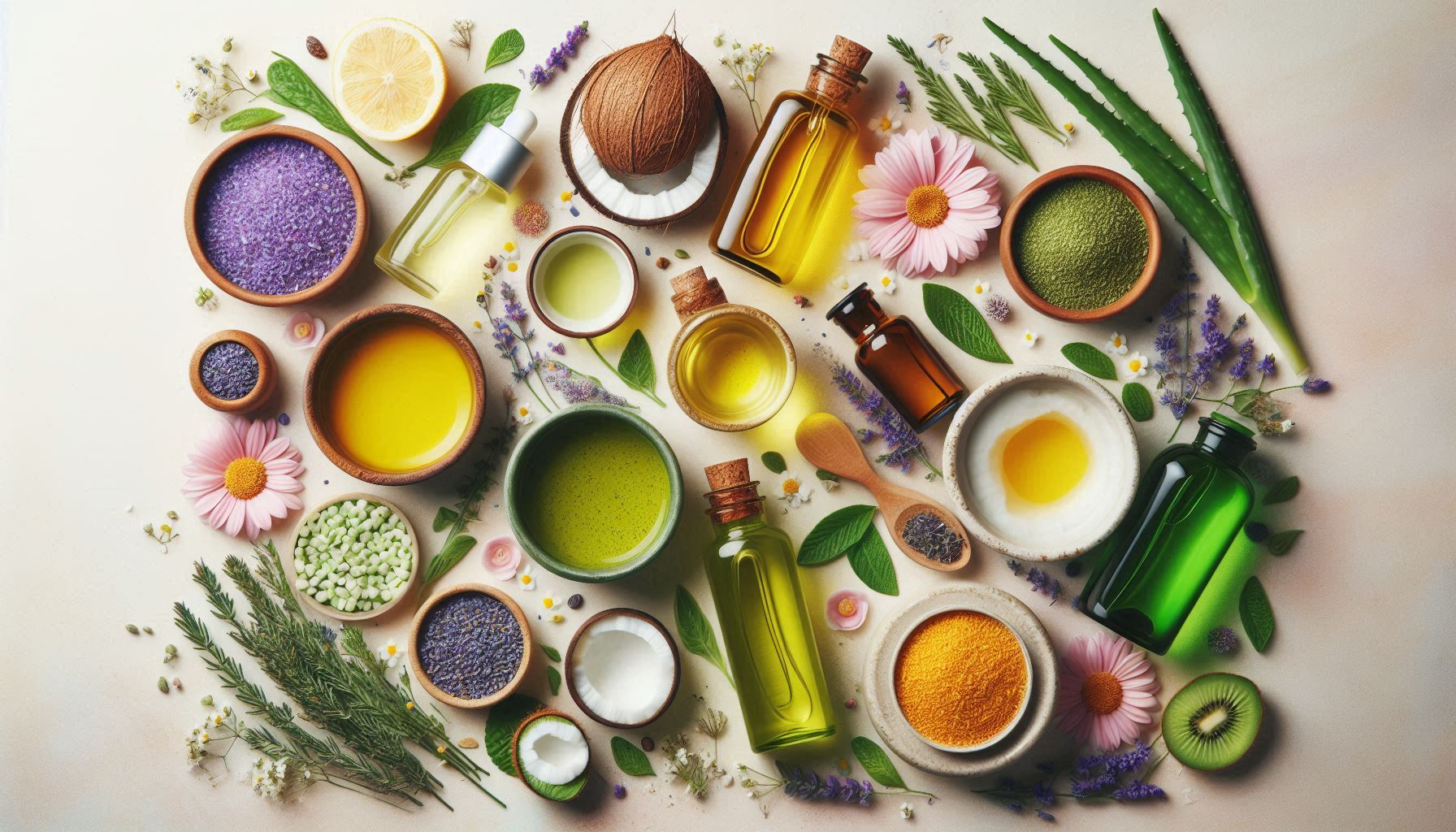Harnessing the Power of Natural Oils: A Guide to Herbal Remedies for Skincare
Natural oils and herbal remedies have been cherished for centuries for their skin-enhancing properties. From ancient beauty rituals to modern skincare regimens, these natural ingredients offer a wealth of benefits due to their rich compositions of vitamins, fatty acids, antioxidants, and other therapeutic compounds. This guide explores the different types of natural oils and herbal remedies, their unique properties, and how to incorporate them effectively into your skincare routine for a holistic approach to beauty.
Understanding Natural Oils and Herbal Remedies
Natural oils are derived from various plant sources, including seeds, nuts, and fruits. They are packed with nutrients that benefit the skin in numerous ways. Unlike many synthetic skincare products, natural oils are often free from harsh chemicals and preservatives, making them a gentler option for all skin types. Similarly, herbal remedies harness the power of plants to promote health and wellness, providing additional support for skin concerns. By integrating both natural oils and herbal remedies, you can enhance your skincare routine and embrace a more holistic approach.

Types of Natural Oils
Natural oils can be broadly categorized into two main types: carrier oils and essential oils.
1. Carrier Oils
Carrier oils serve as the base for essential oils and are often used to dilute their potency. Some common carrier oils include:
- Jojoba Oil: This oil closely resembles the skin’s natural sebum, making it suitable for all skin types, including oily and acne-prone skin. It helps to balance oil production and provides hydration.
- Sweet Almond Oil: Rich in vitamins A and E, this oil is excellent for dry and sensitive skin, providing nourishment and moisture.
- Coconut Oil: Known for its deep moisturizing properties, coconut oil contains fatty acids that hydrate and protect the skin, making it ideal for dry or mature skin.
- Olive Oil: A staple in many kitchens, olive oil is rich in antioxidants and healthy fats, making it an excellent moisturizer and protector for the skin.
2. Essential Oils
Essential oils are concentrated plant extracts that offer specific therapeutic benefits. They are typically used in combination with carrier oils. Notable essential oils include:
- Tea Tree Oil: Renowned for its antimicrobial properties, tea tree oil is effective for acne-prone skin and helps reduce inflammation.
- Lavender Oil: This oil has calming and anti-inflammatory effects, making it perfect for sensitive or irritated skin.
- Rosemary Oil: Known to promote circulation, rosemary oil can help revitalize dull or tired skin.
- Chamomile Oil: With its soothing properties, chamomile oil is great for calming redness and irritation, making it suitable for sensitive skin types.
Exploring Herbal Remedies for Skincare
In addition to natural oils, various herbal remedies can enhance skin health. Herbs have been used for centuries for their medicinal properties, and many can be easily incorporated into your skincare routine:
- Aloe Vera: Known for its soothing and hydrating properties, aloe vera gel can help calm irritated skin, reduce redness, and provide moisture. It’s an excellent choice for sunburns and dry skin.
- Calendula: This vibrant flower has anti-inflammatory and antimicrobial properties, making it ideal for soothing sensitive or irritated skin. Calendula-infused oils or creams can promote healing and reduce redness.
- Green Tea: Rich in antioxidants, green tea can help protect the skin from environmental damage and reduce signs of aging. You can use green tea extracts in serums or masks for added benefits.
- Nettle: Often overlooked, nettle is rich in vitamins and minerals. Nettle tea can be consumed for its health benefits, or nettle extracts can be applied topically to reduce inflammation and promote healthy skin.
Benefits of Natural Oils and Herbal Remedies
Incorporating natural oils and herbal remedies into your skincare routine can provide a multitude of benefits:
- Moisturization: Both natural oils and herbal extracts help lock in moisture and create a barrier that prevents water loss, ensuring your skin remains hydrated.
- Anti-Aging: Rich in antioxidants, these ingredients can combat free radical damage, helping to reduce signs of aging and promote a youthful appearance.
- Soothing: Many oils and herbal remedies possess anti-inflammatory properties that can calm irritated or sensitive skin, making them suitable for various skin concerns.
- Nourishment: The essential fatty acids, vitamins, and antioxidants found in natural oils and herbs nourish the skin, promoting a healthy and radiant complexion.
Choosing the Right Natural Oil and Herbal Remedy for Your Skin Type
Selecting the appropriate oil or herbal remedy depends on your specific skin type and concerns. Here’s a guide to help you choose:
Oily Skin
Despite the common belief that oils are unsuitable for oily skin, certain oils can actually help regulate sebum production:
- Jojoba Oil: Its structure mimics the skin’s natural oils, helping to balance oil production.
- Grape Seed Oil: Lightweight and non-comedogenic, it controls excess oil while offering antioxidant properties.
- Hemp Seed Oil: Rich in essential fatty acids, it is low in comedogenicity, making it a good choice for oily and acne-prone skin.
- Green Tea Extract: Helps reduce oiliness and can soothe acne-prone skin due to its anti-inflammatory properties.
Dry Skin
For those with dry skin, oils and herbal remedies can provide deep hydration and form a protective barrier:
- Argan Oil: Packed with vitamin E and fatty acids, it hydrates and softens dry skin effectively.
- Marula Oil: Lightweight yet moisturizing, it helps restore the skin’s moisture balance.
- Avocado Oil: Rich in vitamins A, D, and E, this oil deeply nourishes and hydrates dry skin.
- Aloe Vera: Its hydrating and soothing properties make it an excellent choice for dry or sunburned skin.
Combination Skin
Combination skin requires a balance of hydration and oil control:
- Rosehip Oil: Provides both hydration and oil control, thanks to its blend of essential fatty acids and antioxidants.
- Squalane Oil: Mimicking the skin’s natural oils, it helps maintain hydration without feeling greasy.
- Chamomile Extract: Soothes any irritated areas while hydrating the drier parts of your skin.
Sensitive Skin
For sensitive skin, soothing and gentle oils and herbs are essential to avoid irritation:
- Chamomile Oil: Known for its calming properties, it can reduce redness and irritation.
- Calendula Oil: Gentle and anti-inflammatory, calendula oil is perfect for sensitive skin types.
- Lavender Oil: Offers calming effects and can help with minor irritations.
How to Use Natural Oils and Herbal Remedies in Your Skincare Routine
Incorporating natural oils and herbal remedies into your skincare routine can be done in various ways:
1. As a Moisturizer
- Direct Application: Apply a few drops of your chosen oil or a soothing herbal remedy to clean, damp skin. Massage gently until absorbed. This can be done once or twice daily.
- Oil Blends: Mix a carrier oil with a few drops of essential oil or herbal extract for added benefits. For example, blend jojoba oil with lavender oil for soothing effects.
2. In Cleansing
- Oil Cleansing Method: Apply a small amount of oil to dry skin, massaging gently to dissolve makeup and impurities. Use a warm, damp cloth to wipe away the residue.
- Herbal Infused Cleansers: Use cleansers infused with calming herbs like chamomile or calendula for added soothing properties.
3. In Exfoliation
- Oil-Based Scrubs: Combine oil with exfoliating agents like sugar or coffee grounds to create a gentle scrub. Massage onto damp skin in circular motions and rinse thoroughly.
- Herbal Scrubs: Incorporate dried herbs such as oatmeal or chamomile into your scrubs for their exfoliating and soothing benefits.
4. As a Treatment
- Spot Treatment: Apply a drop of tea tree oil directly to blemishes to reduce inflammation and speed healing.
- Overnight Masks: Apply a thicker layer of oil or a herbal remedy as an overnight mask, allowing it to absorb overnight for deep hydration.
5. In Facial Masks
- DIY Masks: Combine natural oils with other ingredients to create nourishing masks. For example, mix avocado oil with honey and yogurt for a hydrating treatment.
- Herbal Masks: Use herbs like green tea or aloe vera in masks to soothe and hydrate the skin.
Precautions and Tips
- Patch Testing: Always perform a patch test before using a new oil or herbal remedy to check for allergic reactions. Apply a small amount to a discreet area and wait 24 hours for any adverse reactions.
- Storage: Store oils and herbal preparations in a cool, dark place to prevent rancidity. Many oils come in dark glass bottles to protect them from light.
- Combining Oils and Herbs: When blending oils and herbal remedies, be mindful of ratios and properties to avoid irritation.
- Avoiding Overuse: A little goes a long way with natural oils and herbs; overuse can lead to clogged pores or greasiness.
Common Myths about Natural Oils and Herbal Remedies
- Oils Are Only for Dry Skin: Contrary to popular belief, oils and herbal remedies can benefit all skin types, including oily and acne-prone skin, when used correctly.
- Natural Oils Cause Breakouts: Some oils may exacerbate acne; however, non-comedogenic oils like jojoba and grape seed can actually help regulate oil production.
- All Oils and Herbs Are the Same: Different natural oils and herbs have unique properties and benefits, making it essential to choose the right ones for your specific skin concerns.
Conclusion
Natural oils and herbal remedies provide a versatile and effective means of enhancing your skincare routine. By understanding their unique properties and benefits, you can choose the right oils and herbs to address your skin type and concerns. Whether used for moisturizing, cleansing, or treating specific issues, these ingredients align with a natural and holistic approach to beauty. Embrace the power of natural oils and herbal remedies to achieve healthier, more radiant skin and enjoy the personalized care they bring to your skincare regimen.
SOURCES
International Journal of Cosmetic Science 2013 – Jojoba oil in dermatology
Journal of Dermatological Treatment 2016 – Essential oils and their applications in dermatology.
Cosmetics 2015 – The use of rosehip oil in dermatology: A review of current evidence.
Journal of Clinical and Aesthetic Dermatology 2019 – The benefits of using marula oil for skincare.
Journal of Cosmetic Dermatology 2016 – The role of coconut oil in dermatological health.
Journal of Dermatology & Dermatologic Surgery 2017 – The impact of carrier oils on skin health: A comprehensive review.
International Journal of Research in Dermatology 2018 – The benefits of essential oil in cosmetic dermatology.
Skin Therapy Letter 2020 – Advances in natural oil-based skincare formulations.
HISTORY
Current Version
September 16, 2024
Written By:
BARIRA MEHMOOD
